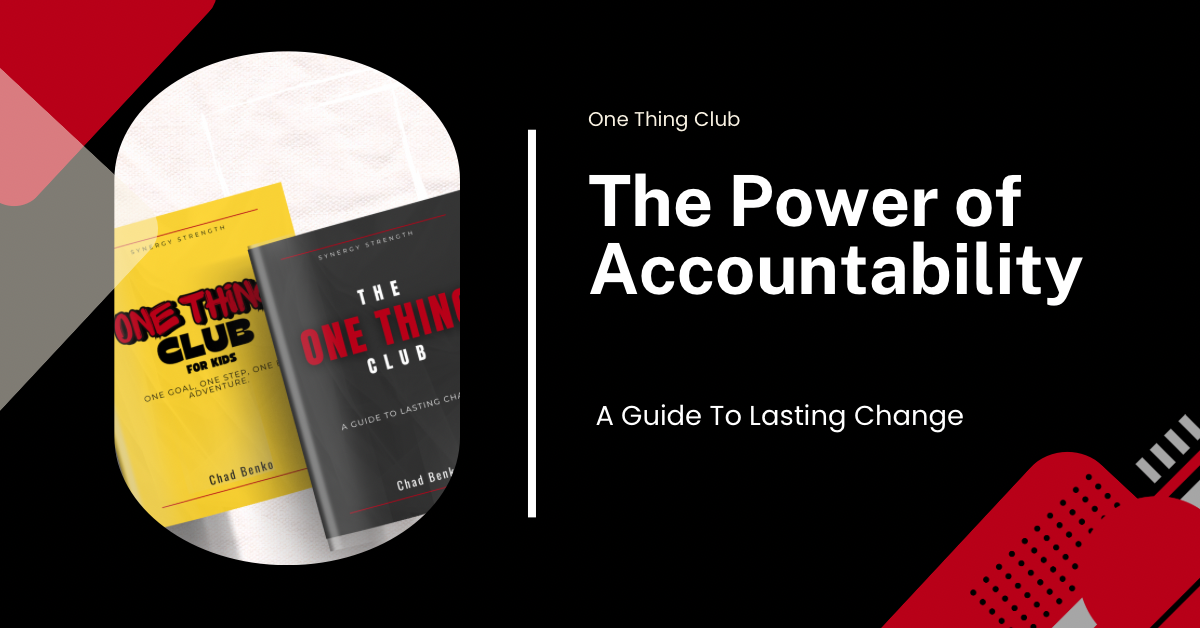The Power of Accountability in Achieving Goals and Building New Habits
When it comes to achieving a goal or implementing a new habit, the road to success is often fraught with challenges. Life gets busy, motivation wanes, and setbacks are inevitable. This is where the magic of accountability comes into play. Accountability isn’t just a buzzword; it’s a powerful tool that can bridge the gap between setting a goal and actually achieving it. At Synergy Strength, we’ve embraced this concept through our One Thing Club, a program designed to help participants focus on building a single new habit or achieving one significant goal over 66 days—the scientifically backed timeframe for habit formation. Central to the program is the use of accountability partnerships, a key factor in turning intentions into reality.
Why Accountability Matters
Research has shown that people are significantly more likely to achieve their goals when they are accountable to someone else. A study from the American Society of Training and Development (ASTD) found that individuals have a 65% chance of completing a goal if they commit to someone. This percentage jumps to 95% when they have a specific accountability appointment with that person.
But why is accountability so effective? Here are a few reasons:
External Motivation: While internal motivation is essential, having someone else checking in with you can provide the external push needed to stay on track.
Increased Focus: Knowing that someone will ask about your progress keeps you laser-focused on the task at hand.
Support During Setbacks: An accountability partner can provide encouragement, perspective, and strategies when things don’t go as planned.
Enhanced Commitment: When you’ve promised someone else that you’ll complete a task, you’re more likely to honor that commitment.
ACCOUNTABILITY AND THE HABIT LOOP
Habits are formed through a simple neurological loop: cue, routine, and reward. Accountability fits seamlessly into this structure. When you involve someone else in your habit-building process, they become part of the “cue” that prompts your action. The routine becomes easier to stick to because you’re reporting on it, and the reward is the positive reinforcement you receive from your partner—a simple “Great job!” can go a long way.
For example, if your goal is to exercise daily, your accountability partner might check in every evening to ask how your workout went. This check-in acts as a cue, reinforcing the habit loop and making it easier to stick to your routine over time.
THE 66 DAY ACCOUNTABILITY AND CHALLENGE
The One Thing Club at Synergy Strength is built around the principle that it takes, on average, 66 days to form a new habit. During this time, participants focus on one goal or habit—whether it’s drinking more water, meditating daily, or hitting a fitness milestone. The program’s core feature is the pairing of participants with accountability partners who:
Track Progress: Regular check-ins help ensure that both partners are staying on course.
Celebrate Wins: Recognizing even small achievements keeps motivation high.
Provide Honest Feedback: Constructive criticism and encouragement help refine the process.
Foster Consistency: Knowing someone is counting on you makes it harder to skip a day.
BUILDING A CULTURE OF ACCOUNTABILITY
Accountability isn’t just about individual relationships; it’s about creating an environment where everyone feels supported and driven. The One Thing Club fosters this culture through:
Community Check-Ins: Group accountability adds an extra layer of motivation and camaraderie.
Progress Tracking Tools: Participants log their progress in a shared platform, making it visible to others and reinforcing commitment.
Shared Celebrations: At the end of the 66 days, we celebrate everyone’s achievements, no matter how big or small.
PRACTICAL TIPS FOR IMPLEMNETING ACCOUNTABILITY
Whether you’re part of a program like the One Thing Club or embarking on a personal journey, here are some practical ways to integrate accountability into your goal-setting process:
Set Clear Goals: Be specific about what you want to achieve and why it matters to you.
Establish Check-In Points: Schedule regular meetings or calls with your accountability partner to discuss progress.
Use Technology: Apps like Whatsapp, or even a simple shared Google Sheet can help track progress and facilitate communication.
Be Open and Honest: Share both successes and struggles with your partner. Vulnerability builds trust and strengthens the partnership.
Reward Yourself: Celebrate milestones along the way to keep the process enjoyable and motivating.
CONCLUSION
Accountability is not a sign of weakness; it’s a strategy for success. By involving others in your journey, you gain access to external motivation, support, and encouragement that can make all the difference. At Synergy Strength, the One Thing Club is our way of harnessing the power of accountability to help participants achieve their goals and build lasting habits. Whether your aim is personal growth, improved health, or professional success, remember: you don’t have to go it alone. Together, we can accomplish incredible things.
Ready to take on the 66-day challenge and transform your life? Join the One Thing Club and discover the power of accountability for yourself!

